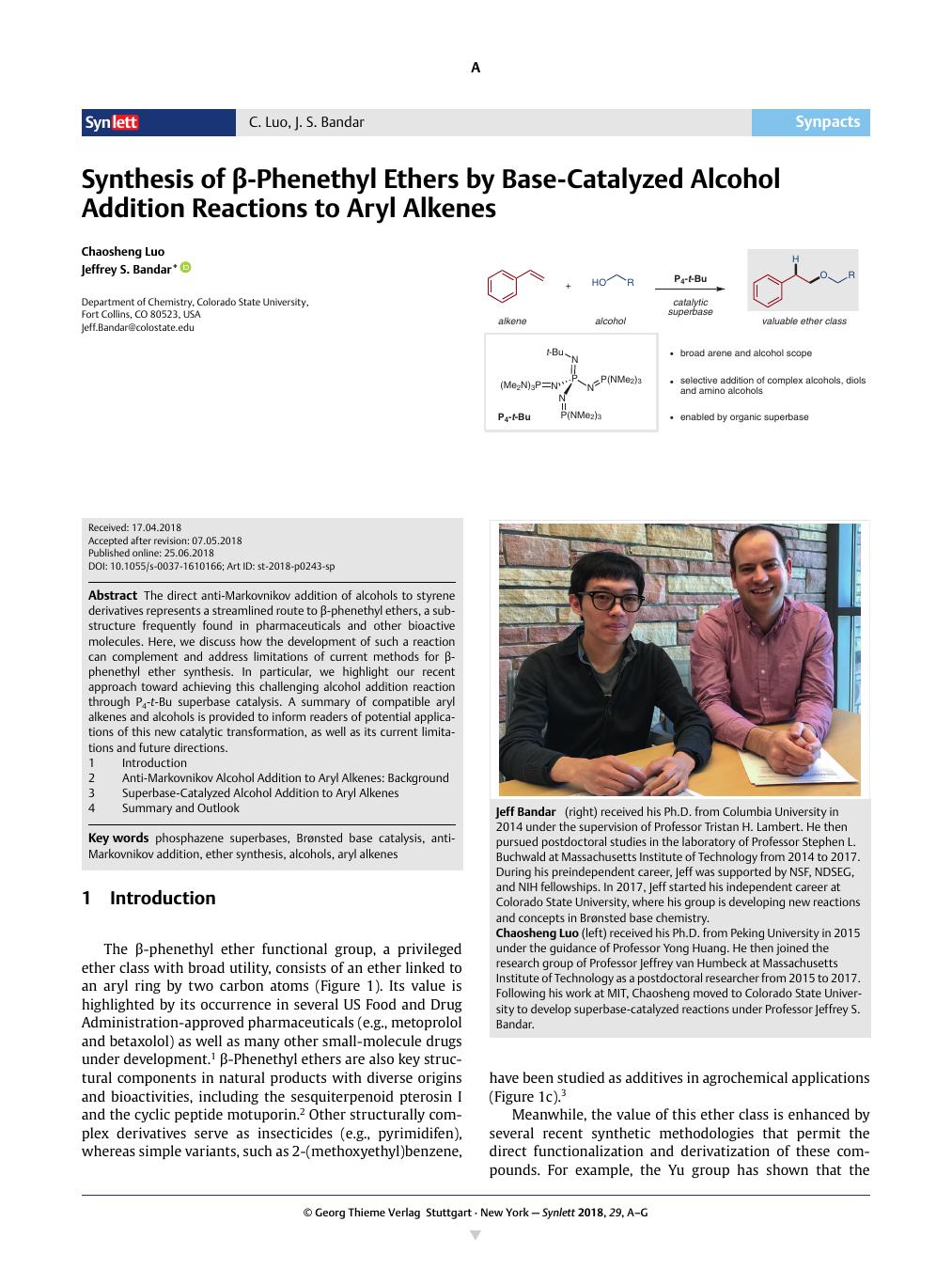Our official English website, www.x-mol.net, welcomes your feedback! (Note: you will need to create a separate account there.)
Synthesis of β-Phenethyl Ethers by Base-Catalyzed Alcohol Addition Reactions to Aryl Alkenes
Synlett ( IF 2 ) Pub Date : 2018-06-25 , DOI: 10.1055/s-0037-1610166 Jeffrey Bandar 1 , Chaosheng Luo 1
Synlett ( IF 2 ) Pub Date : 2018-06-25 , DOI: 10.1055/s-0037-1610166 Jeffrey Bandar 1 , Chaosheng Luo 1
Affiliation

|
The direct anti-Markovnikov addition of alcohols to styrene derivatives represents a streamlined route to β-phenethyl ethers, a substructure frequently found in pharmaceuticals and other bioactive molecules. Here, we discuss how the development of such a reaction can complement and address limitations of current methods for β-phenethyl ether synthesis. In particular, we highlight our recent approach toward achieving this challenging alcohol addition reaction through P4-t-Bu superbase catalysis. A summary of compatible aryl alkenes and alcohols is provided to inform readers of potential applications of this new catalytic transformation, as well as its current limitations and future directions. 1 Introduction 2 Anti-Markovnikov Alcohol Addition to Aryl Alkenes: Background 3 Superbase-Catalyzed Alcohol Addition to Aryl Alkenes 4 Summary and Outlook
中文翻译:

芳基烯烃碱催化醇加成反应合成β-苯乙醚
将醇直接反马尔可夫尼科夫加成到苯乙烯衍生物代表了一种简化的途径,即 β-苯乙醚,这是一种常见于药物和其他生物活性分子的亚结构。在这里,我们讨论了这种反应的发展如何补充和解决当前 β-苯乙醚合成方法的局限性。我们特别强调了我们最近通过 P4-t-Bu 超碱催化实现这种具有挑战性的醇加成反应的方法。提供了相容的芳基烯烃和醇的摘要,以告知读者这种新催化转化的潜在应用,以及其当前的局限性和未来的方向。1 引言 2 反马尔科夫尼科夫醇加入芳基烯烃:背景 3 超碱催化醇加入芳基烯烃 4 总结和展望
更新日期:2018-06-25
中文翻译:

芳基烯烃碱催化醇加成反应合成β-苯乙醚
将醇直接反马尔可夫尼科夫加成到苯乙烯衍生物代表了一种简化的途径,即 β-苯乙醚,这是一种常见于药物和其他生物活性分子的亚结构。在这里,我们讨论了这种反应的发展如何补充和解决当前 β-苯乙醚合成方法的局限性。我们特别强调了我们最近通过 P4-t-Bu 超碱催化实现这种具有挑战性的醇加成反应的方法。提供了相容的芳基烯烃和醇的摘要,以告知读者这种新催化转化的潜在应用,以及其当前的局限性和未来的方向。1 引言 2 反马尔科夫尼科夫醇加入芳基烯烃:背景 3 超碱催化醇加入芳基烯烃 4 总结和展望


























 京公网安备 11010802027423号
京公网安备 11010802027423号